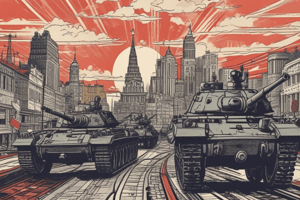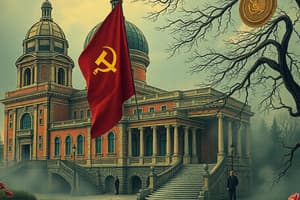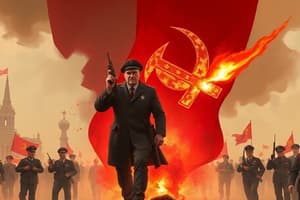Podcast
Questions and Answers
What fundamental difference in focus emerged between the United States and the Soviet Union after World War II?
What fundamental difference in focus emerged between the United States and the Soviet Union after World War II?
- Both nations prioritized military expansion, leading to direct confrontation.
- The United States focused on economic stability and global trade, while the Soviet Union prioritized securing its borders and satellite states. (correct)
- Both nations agreed on the need to weaken Germany but disagreed on the methods.
- The Soviet Union aimed to rapidly democratize Eastern Europe, while the United States sought to maintain colonial empires.
Why were Soviet leaders concerned about security after World War II?
Why were Soviet leaders concerned about security after World War II?
- They feared a revolution within the Soviet Union.
- They feared economic competition from the United States.
- They worried about the resurgence of Japan as a global power.
- They remembered Germany's prior invasions of Russia. (correct)
- They anticipated a naval invasion of the Soviet coastline.
How did American officials believe the Depression contributed to the outbreak of World War II?
How did American officials believe the Depression contributed to the outbreak of World War II?
- It forced governments to invest heavily in military spending, leading to an arms race.
- It caused widespread famine and disease, weakening nations' ability to resist aggression.
- It prompted nations to pursue aggressive trade policies and seek resources through conflict. (correct)
- It led to mass migrations that destabilized national borders.
What conviction did President Roosevelt and his advisors hold regarding economic growth and world peace by 1945?
What conviction did President Roosevelt and his advisors hold regarding economic growth and world peace by 1945?
What key pledge did Stalin make at the Yalta Conference regarding the war effort?
What key pledge did Stalin make at the Yalta Conference regarding the war effort?
What complex situation arose in Poland following its liberation by Soviet troops?
What complex situation arose in Poland following its liberation by Soviet troops?
What was Churchill's perspective on the future of Poland following World War II?
What was Churchill's perspective on the future of Poland following World War II?
What was Stalin's primary condition for the Polish government after the war?
What was Stalin's primary condition for the Polish government after the war?
What compromise was eventually reached regarding the Polish government at the Yalta Conference?
What compromise was eventually reached regarding the Polish government at the Yalta Conference?
What key principle was asserted in the Declaration of Liberated Europe?
What key principle was asserted in the Declaration of Liberated Europe?
In what manner was Germany divided after World War II, according to agreements made by the Allied leaders?
In what manner was Germany divided after World War II, according to agreements made by the Allied leaders?
What specific demand did Stalin make regarding Germany's postwar obligations?
What specific demand did Stalin make regarding Germany's postwar obligations?
What disagreement about Germany ultimately increased tensions between the United States and Soviet Union?
What disagreement about Germany ultimately increased tensions between the United States and Soviet Union?
How did the Soviets act in Romania shortly after the Yalta Conference?
How did the Soviets act in Romania shortly after the Yalta Conference?
What accusation did the United States make against the Soviets following their actions in Romania and Poland?
What accusation did the United States make against the Soviets following their actions in Romania and Poland?
What action did President Roosevelt take in response to Soviet actions in Poland?
What action did President Roosevelt take in response to Soviet actions in Poland?
What limit did the Soviets impose on non-Communists in the Polish government?
What limit did the Soviets impose on non-Communists in the Polish government?
Besides Stalin's security concerns, what other ideological factor influenced Soviet leaders' thinking after World War II?
Besides Stalin's security concerns, what other ideological factor influenced Soviet leaders' thinking after World War II?
How did the Soviets view capitalist countries after World War II?
How did the Soviets view capitalist countries after World War II?
What significant event occurred eleven days after President Roosevelt voiced his disapproval of Soviet actions in Poland?
What significant event occurred eleven days after President Roosevelt voiced his disapproval of Soviet actions in Poland?
Flashcards
Clash of Interests
Clash of Interests
Before World War II ended, tensions emerged between the wartime alliance of the US and Soviet Union.
Soviet Security Concerns
Soviet Security Concerns
The Soviet Union wanted a weak Germany under their control for security.
Soviet Ideology
Soviet Ideology
The Soviets believed Communism would eventually replace capitalism and should be encouraged globally.
American Economic Concerns
American Economic Concerns
Signup and view all the flashcards
Promote World Trade
Promote World Trade
Signup and view all the flashcards
Yalta Conference
Yalta Conference
Signup and view all the flashcards
Soviet Pledge Against Japan
Soviet Pledge Against Japan
Signup and view all the flashcards
The Issue of Poland
The Issue of Poland
Signup and view all the flashcards
Declaration of Liberated Europe.
Declaration of Liberated Europe.
Signup and view all the flashcards
Divided Germany
Divided Germany
Signup and view all the flashcards
German Reparations
German Reparations
Signup and view all the flashcards
Tensions Over Germany
Tensions Over Germany
Signup and view all the flashcards
Soviet Influence in Romania
Soviet Influence in Romania
Signup and view all the flashcards
Limited Polish Representation
Limited Polish Representation
Signup and view all the flashcards
Study Notes
- Prior to the end of World War II, the wartime alliance between the United States and the Soviet Union began to show signs of strain.
- President Roosevelt hoped victory over the Axis and the creation of the United Nations would lead to a more peaceful world.
- Instead, the United States and the Soviet Union became increasingly hostile towards each other after the war ended.
Soviet Security Concerns
- The Soviets sought to keep Germany weak and ensure that the countries between Germany and the Soviet Union were under Soviet control.
- Tensions between the United States and the Soviet Union increased due to differing goals between the two sides.
- Soviet leaders became concerned about security as the war ended.
- Germany had invaded Russia twice in fewer than 30 years.
- Soviet leaders were Communists and believed that communism was a superior economic system that would eventually replace capitalism.
- The Soviet Union thought that they should encourage communism in other nations.
- They believed that capitalist countries would eventually try to destroy communism.
- This made Soviet leaders suspicious of capitalist nations.
American Economic Concerns
- American leaders focused on economic problems, while Soviet leaders focused on securing their borders.
- Many American officials believed that the Depression had caused World War II.
- Without the Depression, Hitler would never have come to power, and Japan would not have wanted to expand its empire.
- Nations that isolate themselves economically force others to go to war to get the resources they need.
- By 1945, President Roosevelt and his advisors were convinced that economic growth was key to world peace.
- They wanted to promote economic growth by increasing world trade.
- American leaders believed that democratic governments with protections for people's rights made countries more stable and peaceful.
- A free enterprise system was seen as the best route to prosperity.
The Yalta Conference
- In February 1945, Allied leaders, including President Roosevelt, Britain's Winston Churchill, and Soviet leader Joseph Stalin, met at the Soviet resort of Yalta to plan the postwar world.
- Stalin reaffirmed the Soviet pledge to enter the war against Japan after Germany was defeated.
- Several agreements reached at Yalta later played an important role in causing the Cold War.
Poland
- Shortly after the Germans invaded Poland, the Polish government leaders fled to Britain.
- In 1944, Soviet troops drove back the Germans and entered Poland.
- The first issue discussed at Yalta was Poland.
- As the Soviets liberated Poland from German control, they encouraged Polish Communists to set up a new government.
- There were now two governments claiming the right to govern Poland, one Communist and one non-Communist.
- Churchill explained that Poland should be free and sovereign because is what the war against Germany was about.
- Roosevelt and Prime Minister Churchill argued that the Poles should be free to choose their own government and not have one forced on them.
- Stalin responded that the Polish government had to be friendly to the Soviet Union and that it was a matter of "life and death."
- Roosevelt and Churchill agreed to recognize the Polish government set up by the Soviets.
- Stalin agreed that the government would include members of the prewar Polish government and that free elections would be held as soon as possible.
- Roosevelt, Churchill, and Stalin agreed to issue the Declaration of Liberated Europe after reaching a compromise on Poland.
- The declaration asserted the right of all people to choose the form of government under which they will live.
Dividing Germany
- Great Britain, the United States, the Soviet Union, and France would each control one zone of Germany, as agreed by attendees.
- The same four countries would also divide the city of Berlin, even though it was in the Soviet zone.
- Attendees agreed to divide Germany into four zones.
- Stalin wanted to weaken Germany economically, although he was pleased with the decision to divide Germany,
- Stalin demanded that Germany pay heavy reparations for the war damage it caused.
- Roosevelt agreed, but he insisted reparations be based on Germany's ability to pay.
- Stalin agreed that Germany pay reparations with trade goods and products instead of cash.
- The Allies would also be allowed to remove industrial machinery, railroad cars, and other equipment from Germany as reparations.
- Arguments about reparations and economic policy in Germany increased tension between the United States and the Soviet Union.
- Arguments about reparations and economic policy in Germany became one of the major causes of the Cold War.
Tensions Begin to Rise
- The Yalta decisions shaped the expectations of the United States.
- Two weeks after Yalta, the Soviets pressured the King of Romania into appointing a Communist government.
- The United States accused the Soviets of violating the Declaration of Liberated Europe.
- Soon afterward, the Soviets refused to allow more than three non-Communist Poles to serve in the 18-member Polish government.
- There was no indication that the Soviets intended to hold free elections in Poland as promised.
- On April 1, President Roosevelt informed the Soviets that their actions in Poland were not acceptable.
- Eleven days later, with Soviet American relations deteriorating, President Roosevelt died (he collapsed and died of a cerebral hemorrhage), and Vice President Harry Truman took office.
Studying That Suits You
Use AI to generate personalized quizzes and flashcards to suit your learning preferences.




